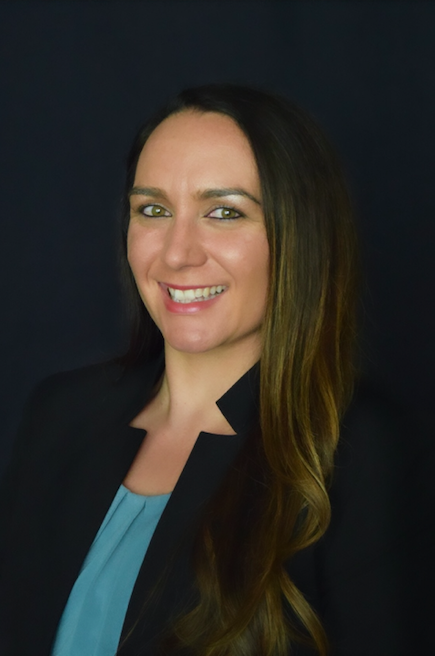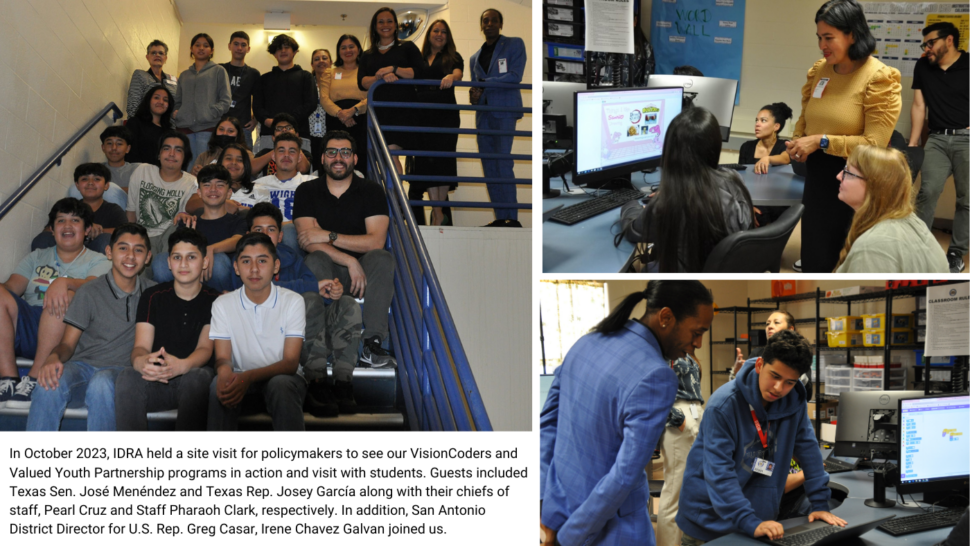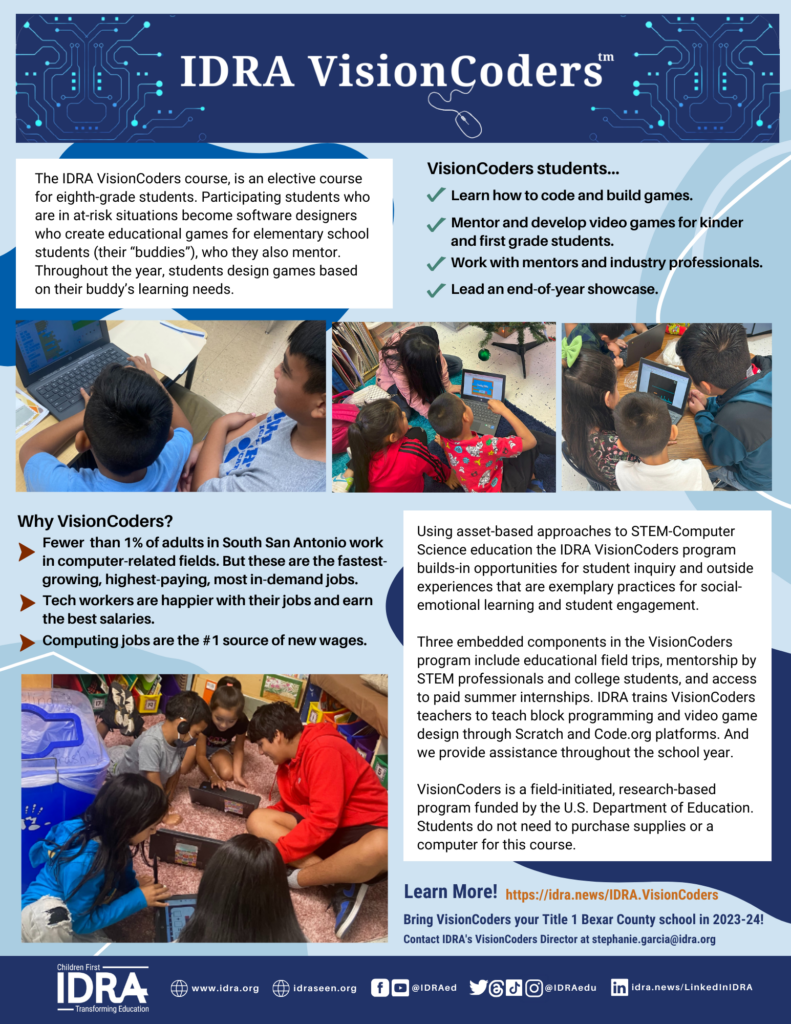• By Stephanie García, Ph.D. • IDRA Newsletter • February 2024 • 
The IDRA VisionCoders program anchors social-emotional learning at its core, centering an asset-based and valuing philosophy that IDRA has been known for since its founding 51 years ago. Others embrace this philosophy, as Laura Weaver and Mark Wilding describe, “When students feel safe and supported… they are truly ready and able to learn and to contribute in positive ways” (Elias, 2013). IDRA is now in the fourth year of this field-initiated, research-based program that is funded by the U.S. Department of Education. And we have truly witnessed this sentiment come to life.
VisionCoders is an eighth-grade computer science course developed by IDRA operating in partnership with eight schools and three school districts in San Antonio. Three embedded components in the program include educational field trips, mentorship by STEM professionals and college students, and access to paid summer internships. 
The central research question anchored in this program of study is, will the intervention, the year-long elective course called VisionCoders, improve students’ computational thinking, computer identity, and math achievement? We will collect and analyze STAAR math scores for students’ seventh and eighth-grade years, scores from the Computational Thinking Test (CTt), and students’ self-efficacy and STEM interest surveys. These will be collected from both VisionCoders and a sample of matched comparison students to compare changes in the outcomes.
This fall, we will expand the program to 12 schools, serving almost 600 eighth-grade students in at-risk situations from school districts where fewer than 1% of students take a computer science class.
The program targets high-need students with limited computer science opportunities. And it is inspired by the needs of prekindergarten through first grade students identified amidst the COVID-19 crisis. As young students struggled to navigate and adapt to online learning, the pandemic forced schools and communities to rethink early childhood online educational resources and remote learning pedagogical practices.
VisionCoders enables students to contribute solutions – a vision in the face of unprecedented challenges – while learning valuable computer science skills and identities. Through this program, eighth-grade students learn coding skills by programming math and reading games for their elementary school buddies. This cross-age mentorship approach enables us to impact hundreds of elementary students who get to know their mentors throughout each buddy visit and to learn from them.
The VisionCoders program centers and values a social-emotional learning approach and challenges exclusionary disciplinary practices. The Office for Civil Rights reports that more than half of students who are suspended from or arrested in school are students of color (CDRC, 2024). In-grade retention (repeating a grade level) is much higher for students of color.
More than ever we need student programs like VisionCoders that increase belonging in STEM, restore school connectedness, and reinforce a positive campus culture. VisionCoders positions students who are seen as “at risk” of dropping out of school and positions them as school leaders and mentors in their school communities.
How VisionCoders Makes Students Feel Safe and Supported
Paula Johnson, Ph.D., and José Velazquez, Ph.D., explained: “The human connection within a community of learners is key to creating safe learning spaces. A positive school culture hinges upon meaningful relationships grounded on trust, mutual respect and deep regard for human dignity. Social-emotional learning plays a key role in this process” (2019).
Each summer, we hold our VisionCoders Summer Institute, which is a three-week professional development experience. The incoming school year’s cohort of teachers receives a stipend to join our professional learning community and learn how to create safe learning spaces while leaning into asset-based practices that value all students. This helps to build teacher capacity to ensure the VisionCoders classroom is a safe space for students where each feels supported by their teacher. 
During the school year, we leverage industry and community partnerships to bring in guest speakers who can offer their support, provide feedback on students’ coding projects, and champion VisionCoders’ success. One VisionCoders student asked a guest speaker – a female computer science graduate student – “How can I do this for the rest of my life?” The student was truly inspired about her future and was seeking advice.
Valued and Known
When IDRA staff asked VisionCoders students during a small group discussion, “What was your favorite part of the VisionCoders program?” Simultaneously, the students responded, “Our buddies!” This brought joy instantly to the room, with their faces lit up. One student, who previously missed school often, shared that she felt excited to come to school when she had a buddy visit planned that day.
When students feel valued and feel like they are making a difference, this impacts them greatly. We have witnessed how programs like IDRA’s VisionCoders and IDRA’s 40-year Valued Youth Partnership program help improve school attendance rates and decrease discipline issues due to its valuing philosophy. Given the role of personal and academic responsibility, students will learn self-discipline and develop self-esteem.
Opportunities for Student Expression
Through a project-based learning and design-thinking approach, VisionCoders students develop a digital portfolio of coding projects, including the educational math and reading games they program and tailor for their elementary buddies. As middle school students, they are designing games based on their preferences and what their buddy enjoys.
When I asked a VisionCoders student why his game focused on mermaids, he said it was because his buddy loves mermaids. His scrolling game also resembled a Mario Brothers-type game, where the mermaid scrolled through the ocean collecting objects of different shapes and colors. He expressed how he loves playing scrolling games, so he expressed himself through his creative project by taking this approach. Through our program, we believe it is important that students have meaningful opportunities to express themselves creatively and critically.
“How can I do this for the rest of my life?”
– VisionCoders student
Skills to Communicate Effectively
Unlike most computer-lab or technology classes where students stare at a screen and learn material on their own, the VisionCoders program gives students multiple hands-on learning opportunities to expand their communication and social skills. This includes collaborative projects, pair-programming learning activities, student presentations, and their educational lessons with their buddies during their monthly visits. These enriching opportunities help sharpen soft skills, which are difficult even for adults, that are transferable to any college and career pathway students choose to pursue.
Opportunities for Students to Contribute in Positive Ways
Maynard & Winstein state: “Many students misbehave because they don’t feel successful academically. If we can build their confidence, the behavior will often take care of itself” (2020). Students need to feel valued and need to be built up, and they will grow.
Throughout the VisionCoders curriculum, especially through our cross-age mentorship component, we are building students’ confidence, so they know they are special and they have something to contribute as they help their buddies. They are given a real-life issue and are asked to address it through the projects they are developing in class. The purpose-driven and meaningful projects help to coach the students and build their capacity to contribute in positive ways within their school communities.
This IDRA program’s systematic and intentional effort to build confidence and leadership in middle school students and cultivate their STEM identities has had great success. It is a unique program that embeds project-based learning, design-thinking, empathy-centered, social-emotional learning, and cross-age mentorships all in one.
If you are in Bexar County, we invite you to join IDRA’s VisionCoders program and implement it in an eighth-grade classroom in your school or district! During 2024-25, we plan to expand to 12 Title I middle school campuses. If you or someone you know in Bexar County, Texas, are interested in bringing the program to your school (at no cost) please share this article and contact me at stephanie.garcia@idra.org.
Resources
CDRC. (2024). National Data, Civil Rights Data Collection. Office for Civil Rights. U.S. Department of Education.
Elias, M.J. (May 9, 2013). Restoring the Soul and Skill of Educators Through Engaged Teaching, Edutopia.
Garcia, S. (November-December 2022). VisionCoders Teens Learn Computer Science to Support Younger Students – IDRA Responds to Pandemic’s Effects on Social Emotional Learning. IDRA Newsletter.
Johnson, P. & Velazquez, J.A. (March 2019). Three Approaches for Dismantling Discriminatory Discipline in Schools. IDRA Newsletter.
Maynard, N., & Weinstein, B. (2020). Hacking School Discipline: 9 Ways to Create a Culture of Empathy and Responsibility Using Restorative Justice.
Stephanie García, Ph.D., is IDRA’s STEM and gender equity education specialist and directs the IDRA VisionCoders program. Comments and questions may be directed to her via email at stephanie.garcia@idra.org.
[© 2024, IDRA. This article originally appeared in the February edition of the IDRA Newsletter. Permission to reproduce this article is granted provided the article is reprinted in its entirety and proper credit is given to IDRA and the author.]


